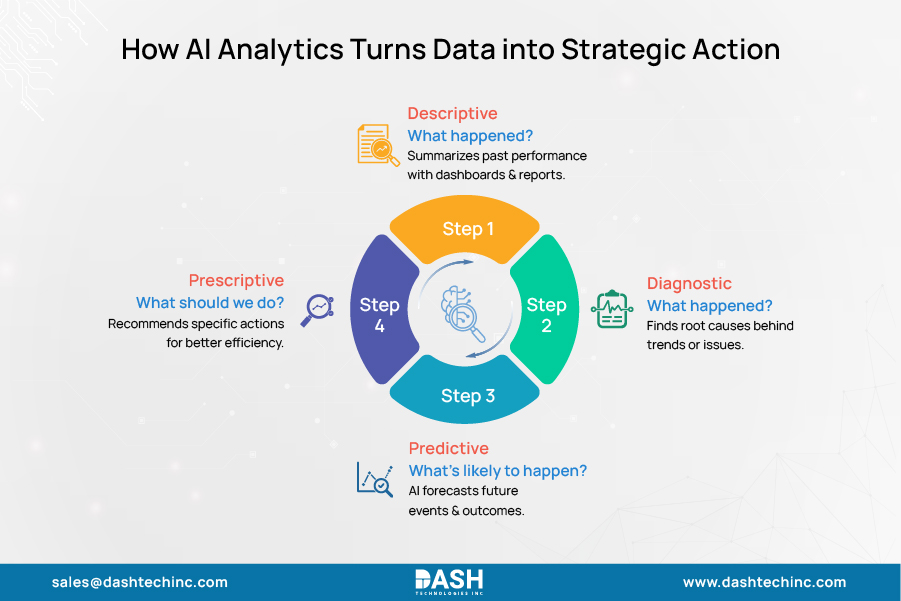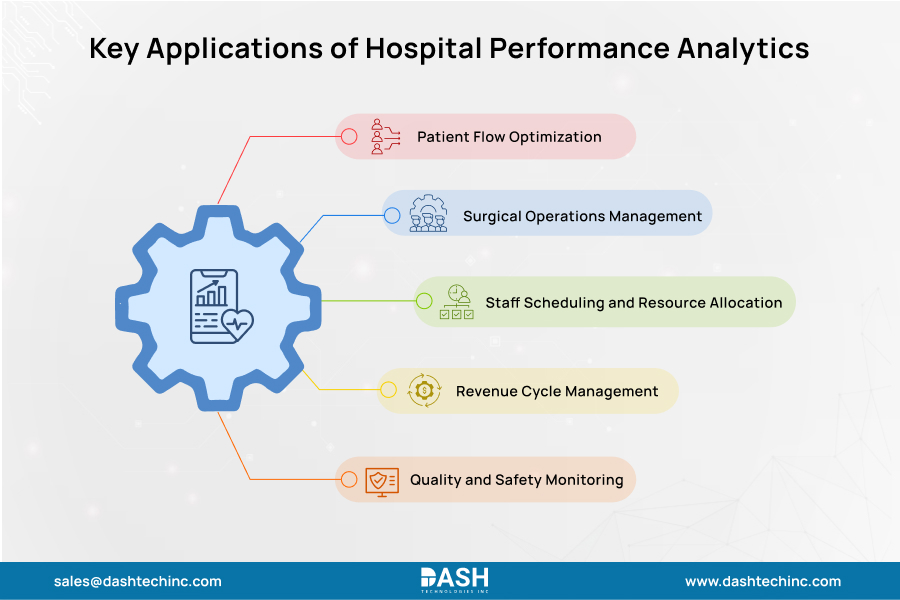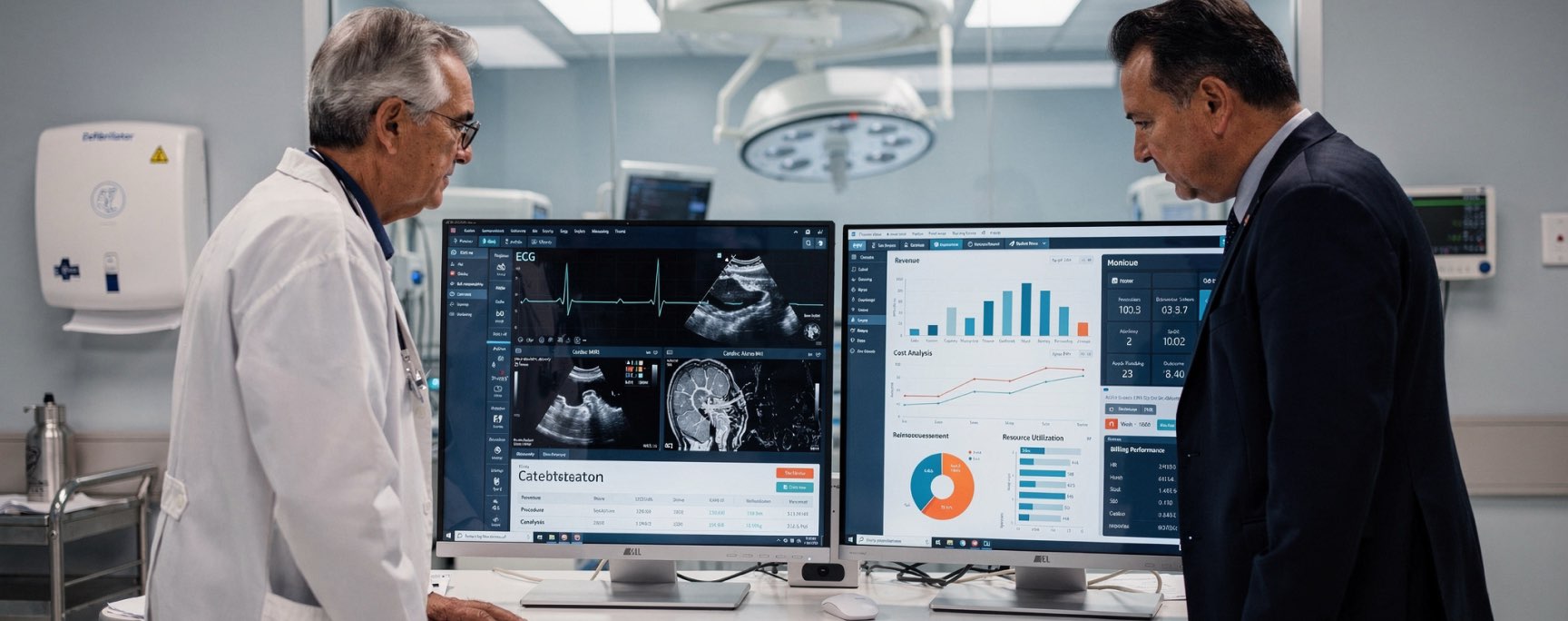Hospital Performance Analytics: How AI Transforms Healthcare Operations Efficiency
Behind the headline-grabbing stories of robot surgeons and diagnostic miracles, there are the most immediate & profound effects of AI in healthcare taking place BTS. AI for hospital operations and hospital performance analytics is not just a pipe dream. It’s real, & it’s here.
Hospitals are the most complex operating environments in modern society. They are intricate ecosystems where clinical excellence, human compassion, & logistical precision need to converge 24/7. Hospital executives have been scrambling to keep up over the past few decades, facing enormous stressors such as rising patient expectations, diminishing margins, regulatory requirements, and the unpredictability of human health. The traditional tools for confronting complexity, spreadsheets, antiquated software, and human intuition, are no longer working.
How AI Analytics Converts Raw Data into a Strategic Outcome

By “AI analytics,” we don’t mean one technology, but rather a continuum of capabilities. It’s important for a hospital to know where each application falls on the continuum so it can determine what’s appropriate.
Descriptive Analytics (What happened?):
This is the foundation. It involves creating dashboards and reports that summarize historical data. For example, a dashboard showing the average patient’s wait time in the ED over the past month. This is the current state of hospital performance analytics.
Diagnostic Analytics (Why did it happen?):
This layer answers the deeper “whys” of what happened. For example, if wait times increase dramatically, diagnostic analytics might show that the increase coincides with a surge in flu patients or a specific staff shortage on the night shift, showcasing the efficiency of AI in hospitals.
Predictive Analytics (What is likely to happen?):
This is where AI hospital software solutions truly begin to shine. By training machine learning models on vast historical datasets (admissions, discharges, lab results, scheduling data), AI for hospital operations can forecast future events. Predictive analytics in healthcare can estimate ED arrivals for the next 12 hours or predict which patients are at high risk for a longer-than-average hospital stay.
Prescriptive Analytics (What should we do about it?):
This is the most advanced stage in healthcare data analytics solutions. It is more than just prediction, as it actually recommends actions to enhance outcomes. For instance, if the healthcare data analytics solutions predict a surge in the emergency department, AI-powered hospital software could recommend hiring two additional nurses and making three specific beds available on the fourth floor to reduce waiting times.
The process, described above, that goes from description to prescription, is driven by an AI hospital management system. This system is the brain of the operation, continually learning from new data to improve its predictions and suggestions.
Turn Data into Measurable Hospital Efficiency
Leverage our AI-powered healthcare solutions to optimize workflows, improve resource allocation, and deliver better patient outcomes—faster and smarter.
Talk to Our Experts
Key Applications of Hospital Performance Analytics
Patient Flow Optimization
Predictive analytics in healthcare can be utilized to optimize patient flow by forecasting admission patterns, predicting discharge timing, & ensuring bed availability. Algorithms that use historical admission data, seasonal patterns, and external factors like weather or local events can forecast patient volume with high accuracy. AI-powered hospital software also offers real-time inpatient anomaly detection & operational forecasts that help in proactive capacity management.
Dynamic bed management is another area where AI analytics is making a huge difference. Predicting patient length of stay and discharge patterns can help hospitals manage bed allocation more efficiently, decrease patient wait times, and improve throughput. These tools can consider various factors, such as diagnosis codes, patient demographics, and treatment plans, to accurately predict the duration of a patient’s stay.
AI analysis is absolutely reliant on emergency department optimization. Multiple variables can be predicted using predictive models to forecast ED volume, and administrators can then adjust staffing levels in advance. Waiting times have been reduced by as much as 37.5% in some hospitals once AI hospital software solutions have been implemented.
Surgical Operations Management
The operating room is one of the most resource-intensive and complex areas of hospital operations; therefore, it is an ideal target for AI-powered solutions that optimize operating room efficiency. By its ability to estimate surgical schedules, procedure times, and resource requirements, AI-powered hospital software aims to maximize OR utilization while minimizing downtime.
Predictive scheduling algorithms consider multiple factors, including surgeon preferences, equipment availability, patient preparation time, and post-operative care requirements, to create optimal surgical schedules. Inventory control is significantly enhanced by AI’s ability to predict usage patterns and prevent stockouts. By utilizing historical usage, procedure schedules, and supply lead times, machine learning algorithms minimize waste while optimizing inventory levels.

Staff Scheduling and Resource Allocation
AI hospital software solutions can enhance staff scheduling by taking into account a broader range of variables that are often overlooked during manual scheduling. These include patient acuity levels, census data, staff skill sets and preferences, & regulatory requirements.
Predictive staffing models can predict weeks in advance the amount of nursing required, and thus the hospital can reduce its reliance on expensive agency personnel. Various healthcare organizations have saved a significant portion of their staffing costs by incorporating AI-powered scheduling systems.
Skill-based matching ensures that patients receive care from appropriately qualified staff members while maximizing staff utilization. AI algorithms consider nurse specializations, certification requirements, and experience levels when creating assignments, improving both care quality and staff satisfaction.
Revenue Cycle Management
Hospital performance analytics greatly enhances revenue cycle management by detecting patterns in collections, billing, and denials. AI for hospital operations can predict denied claims, allowing for intervention beforehand and avoiding revenue loss.
Automated coding assistance helps reduce coding errors & speeds up the billing process. Natural language processing tools can analyze clinical documentation and recommend suitable diagnostic and procedure codes, decreasing the time spent by healthcare providers on administrative tasks.
Patient financial counseling is aided by the outstanding capacity of AI to predict patient payment trends and determine those who may require any sort of financial aid. Such data can guide hospitals to extend the needed support while enhancing collection rates.
Quality and Safety Monitoring
AI efficiency in hospitals extends to monitoring quality and safety through ongoing examination of clinical measures & patient outcomes. Machine learning algorithms can identify patients at risk for hospital-acquired infections, falls, or other adverse events, enabling preventive action.
Medication error prevention systems utilize AI to thoroughly cross-reference a patient’s medications, allergies, and conditions, thereby identifying potential drug interactions or dosing errors before they even reach the patient. In certain uses, these systems have proven to be able to reduce medication errors by as much as 50%.
Clinical decision support tools that utilize AI to analyze patient data and provide evidence-based recommendations to healthcare providers have been shown to enhance the consistency of care and improve patient outcomes, while also reducing diagnostic errors.
Final Thoughts
This future isn’t science fiction. It’s the natural evolution of hospital performance analytics coming together today. Hospitals that undergo this change will not only survive the enormous stresses of modern healthcare but will also set a new benchmark for operational excellence and patient-focused care. They will become truly intelligent, self-optimizing orgs, with a steady, efficient pulse powered by data.
At Dash Technologies, we successfully integrate profound healthcare knowledge with sophisticated AI engineering to provide hospital performance analytics, AI hospital management systems, and AI-powered hospital software solutions, all meticulously designed to comply with FDA, HIPAA, and ISO 13485 regulations.
Ready to turn analytics into actionable efficiency? Contact Dash Technologies today to start your AI journey.
About Dash

Dash Technologies Inc.
We’re technology experts with a passion for bringing concepts to life. By leveraging a unique, consultative process and an agile development approach, we translate business challenges into technology solutions Get in touch.







